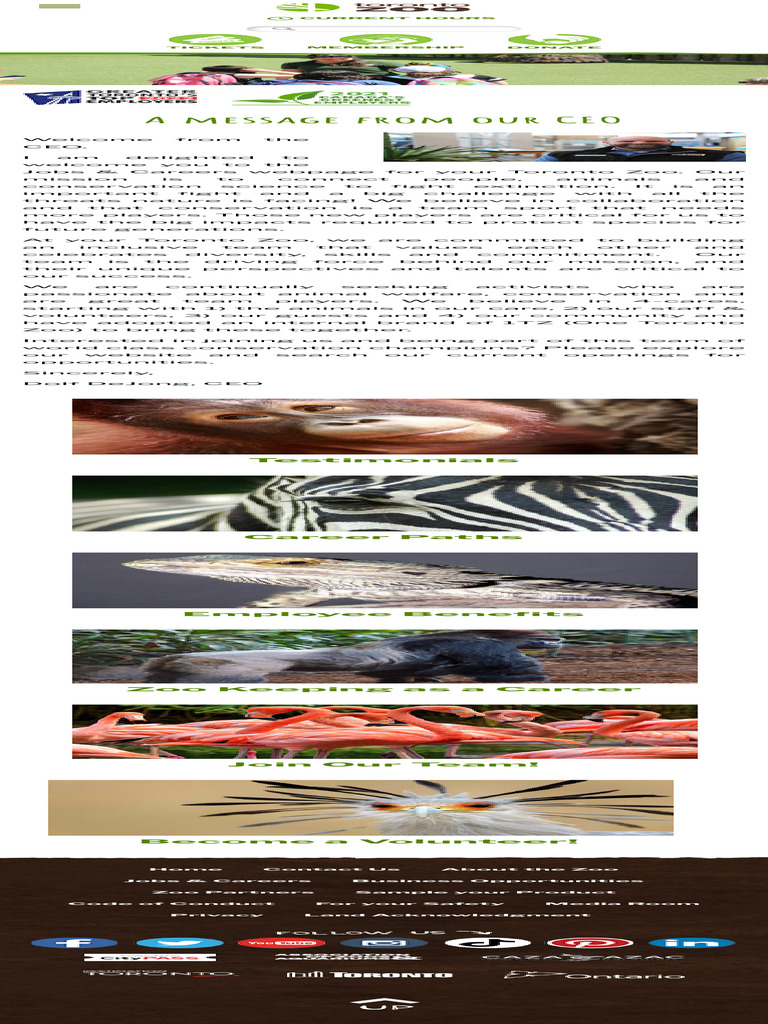Zoo Careers

The world of zoology offers a fascinating array of career paths, each providing unique opportunities to work with animals, contribute to conservation efforts, and make a meaningful impact on the natural world. From caring for exotic species in zoos to conducting research in the wild, the field of zoology is diverse and exciting. In this article, we delve into the diverse roles and responsibilities of professionals working in zoos, shedding light on the education, skills, and experiences needed to pursue these rewarding careers.
The Diversity of Zoo Careers

The realm of zoo careers encompasses a wide range of professions, each with its own set of challenges and rewards. These careers go beyond the traditional image of a zookeeper, offering a multitude of opportunities to engage with animals and contribute to their well-being and conservation.
Zookeepers: Guardians of Animal Welfare
Zookeepers are at the forefront of animal care, responsible for the daily maintenance and welfare of zoo animals. Their duties include feeding, cleaning enclosures, monitoring animal behavior, and administering basic veterinary care. Zookeepers also play a crucial role in educating the public about the animals in their care, sharing knowledge about their natural habitats, behaviors, and conservation status.
| Duties | Key Responsibilities |
|---|---|
| Animal Husbandry | Feeding, cleaning, and maintaining animal enclosures. |
| Behavioral Observation | Monitoring and recording animal behavior for health and research purposes. |
| Public Engagement | Educating visitors about animal species and conservation efforts. |

Zookeepers must possess a deep passion for animals and a commitment to their welfare. They work closely with veterinarians, curators, and other zoo staff to ensure the best possible care for the animals in their charge. The role requires physical stamina, as zookeepers often spend long hours on their feet, and the ability to handle potentially dangerous situations with calm and professionalism.
Veterinarians: The Animal Health Experts
Veterinarians are an integral part of zoo teams, providing medical care and expertise to a diverse range of species. They diagnose and treat illnesses, perform surgeries, and oversee the overall health and well-being of zoo animals. Veterinarians also play a crucial role in preventive medicine, developing and implementing vaccination and parasite control programs.
| Veterinary Roles in Zoos | Key Responsibilities |
|---|---|
| Medical Care | Diagnosis, treatment, and surgery for zoo animals. |
| Preventive Medicine | Vaccination programs, parasite control, and health monitoring. |
| Research Support | Assisting with research projects and data collection. |
Zoo veterinarians often specialize in wildlife medicine, requiring advanced knowledge of exotic species and their unique physiological needs. They work closely with zookeepers and other zoo staff to ensure the health and safety of the animals, and their expertise is vital in emergency situations and long-term care plans.
Curators: The Zoo’s Visionaries
Curators are the strategic planners and decision-makers in zoos. They are responsible for the overall management and operation of the zoo, including the design and development of exhibits, the acquisition and care of animals, and the implementation of conservation and research programs. Curators also oversee the zoo’s educational programs, ensuring that visitors have a meaningful and engaging experience.
| Curatorial Responsibilities | Key Tasks |
|---|---|
| Exhibit Design | Creating naturalistic habitats that meet the needs of zoo animals. |
| Animal Acquisition | Sourcing and acquiring animals, ensuring ethical and legal practices. |
| Conservation Initiatives | Developing and leading conservation programs for endangered species. |
Curators must have a strong background in zoology or a related field, along with excellent organizational and leadership skills. They work closely with zookeepers, veterinarians, and other specialists to ensure the zoo's mission is fulfilled, and they often collaborate with conservation organizations and researchers to advance their conservation efforts.
Education Officers: Inspiring the Next Generation
Education officers play a vital role in zoos by designing and delivering educational programs to visitors of all ages. They create interactive experiences, workshops, and presentations that engage and inform the public about wildlife conservation, animal behavior, and the importance of biodiversity. Education officers also develop educational materials, such as brochures, signage, and online resources, to enhance the visitor experience.
| Education Officer Roles | Key Activities |
|---|---|
| Program Development | Creating engaging educational experiences for zoo visitors. |
| Public Presentations | Conducting talks, demonstrations, and workshops on wildlife topics. |
| Resource Creation | Developing educational materials, including brochures and online content. |
Education officers are passionate communicators with a deep understanding of wildlife and conservation issues. They bridge the gap between the zoo and the public, inspiring a sense of wonder and responsibility for the natural world. Their work is essential in fostering a culture of environmental stewardship and awareness.
Research Scientists: Unraveling the Mysteries of Wildlife
Research scientists in zoos contribute to our understanding of wildlife by conducting scientific studies on zoo animals. They design and execute research projects, collect and analyze data, and publish their findings in scientific journals. Research scientists collaborate closely with zookeepers and veterinarians to ensure the welfare of the animals they study and to translate their research into practical conservation applications.
| Research Scientist Roles | Key Focus Areas |
|---|---|
| Behavioral Research | Studying animal behavior, social dynamics, and cognitive abilities. |
| Conservation Biology | Investigating genetic diversity, population dynamics, and habitat restoration. |
| Veterinary Science | Researching animal diseases, treatments, and veterinary practices. |
Zoo research scientists often have advanced degrees in biology, zoology, or related fields. Their work is crucial for advancing our knowledge of wildlife, informing conservation strategies, and contributing to the broader scientific community. Research scientists in zoos also play a vital role in training and mentoring the next generation of wildlife researchers.
Education and Skills for Zoo Careers

Pursuing a career in zoos requires a combination of education, skills, and experiences. While specific requirements may vary depending on the role and the zoo, there are some common elements that are essential for success in this field.
Education Requirements
Most zoo careers require at least a bachelor’s degree in a relevant field, such as zoology, wildlife biology, animal science, or veterinary medicine. For more advanced roles, such as research scientists and senior curators, a master’s or doctoral degree is often necessary. These advanced degrees provide a deeper understanding of the scientific principles and methodologies that underpin zoo operations and conservation efforts.
Key Skills and Experiences
In addition to academic qualifications, zoo careers demand a range of skills and experiences. Here are some of the key competencies and experiences that are highly valued in the field:
- Animal Handling and Care: Practical experience in handling and caring for animals is essential. This can be gained through internships, volunteer work, or previous employment in animal shelters, wildlife rehabilitation centers, or similar settings.
- Communication and Education: Effective communication skills are vital for interacting with the public, colleagues, and stakeholders. Experience in public speaking, writing, and designing educational materials is highly advantageous.
- Leadership and Management: Leadership skills are crucial for roles such as curators and senior zookeepers. Experience in team management, project coordination, and decision-making is highly valued.
- Research and Analytical Skills: The ability to conduct research, analyze data, and draw meaningful conclusions is essential for research scientists and those involved in conservation planning.
- Problem-Solving and Critical Thinking: Zoo professionals often face complex challenges, requiring creative problem-solving and critical thinking skills to find effective solutions.
The Future of Zoo Careers
The field of zoo careers is evolving rapidly, driven by advancements in technology, changing public attitudes towards wildlife, and the growing importance of conservation efforts. Here are some key trends and developments shaping the future of zoo careers:
Technology Integration
Zoos are increasingly incorporating technology into their operations, from digital record-keeping and animal tracking systems to virtual reality experiences and interactive exhibits. Professionals with skills in data analysis, software development, and digital media production will be in high demand as zoos continue to embrace technological innovations.
Conservation Leadership
With the growing awareness of the global biodiversity crisis, zoos are taking on a more active role in conservation leadership. Zoo professionals are increasingly involved in species recovery programs, habitat restoration efforts, and community engagement initiatives. Those with expertise in conservation biology, environmental education, and community development will be well-positioned to contribute to these critical efforts.
Research and Innovation
Research remains a cornerstone of zoo operations, with a growing focus on applied research that directly informs conservation strategies. Zoo research scientists are collaborating more closely with academic institutions and conservation organizations to advance our understanding of wildlife and develop innovative solutions to conservation challenges.
Diversity and Inclusion
The zoo industry is recognizing the importance of diversity and inclusion in its workforce and leadership. Efforts are being made to attract and retain professionals from diverse backgrounds, ensuring that zoo teams reflect the communities they serve and bringing a wider range of perspectives and experiences to the field.
Wellness and Animal Welfare
Animal welfare is a core value in zoos, and professionals are continuously seeking ways to enhance the well-being of zoo animals. This includes advancements in enclosure design, nutrition, and behavioral enrichment, as well as the development of new veterinary techniques and technologies. Zoo careers that focus on animal welfare and the human-animal bond will continue to be in high demand.
Conclusion: A Rewarding Journey
A career in zoos offers a unique and rewarding path for those with a passion for animals and a desire to make a positive impact on the natural world. From the front-line work of zookeepers to the strategic leadership of curators, and from the research endeavors of scientists to the educational outreach of officers, the diversity of zoo careers ensures that there is a role for almost every interest and skill set.
As zoos continue to evolve and adapt to the changing needs of wildlife and society, the opportunities for meaningful and impactful work in this field will only grow. With dedication, education, and a commitment to animal welfare and conservation, a career in zoos can be a deeply satisfying and enriching journey.
What are the key responsibilities of a zookeeper in a zoo setting?
+Zookeepers have a diverse range of responsibilities, including feeding and caring for animals, cleaning enclosures, monitoring animal behavior, and providing basic veterinary care. They also play a crucial role in educating the public about the animals in their care.
How do veterinarians contribute to the well-being of zoo animals?
+Veterinarians provide medical care, diagnose and treat illnesses, perform surgeries, and oversee the overall health of zoo animals. They also play a vital role in preventive medicine and vaccination programs.
What are the key tasks of a curator in a zoo context?
+Curators are responsible for the overall management of the zoo, including exhibit design, animal acquisition, conservation initiatives, and educational programs. They ensure the zoo’s mission is fulfilled and often collaborate with external organizations.



